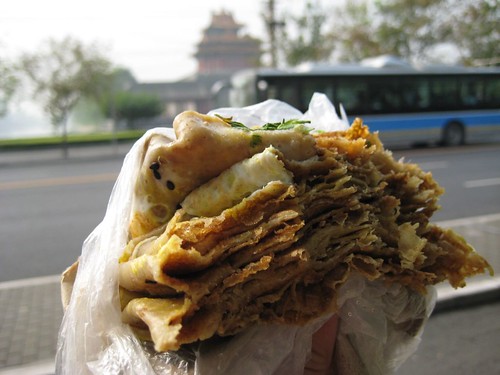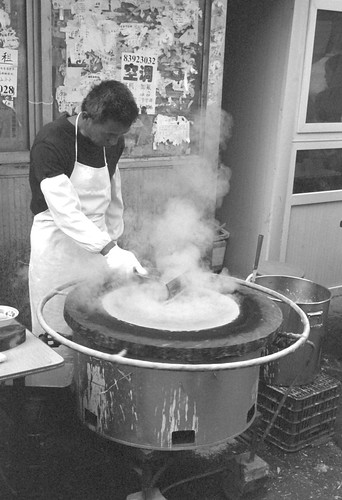When I worked out west in the CuiWei area of Beijing just north of the Wanshoulu subway stop, there was usually a food vendor cart just outside the Prime office in a little alleyway. The cart’s husband-and-wife duo made jian bing and sold them for three kuai (about $0.44).
That is what most jian bing I have seen around look like: an eggy mass that tastes like breakfast and is delicious in its own right. However, that is not the kind of jian bing that was made outside of the old Prime office.
This is more like the style of jian bing I used to have for breakfast every morning. The cart was very similar to this, with the key point being that the round stone on which the crepe-like batter-egg mixture was cooked could be spun by the old man, which made the batter mix spread out over the large stone and made it thin and crispy when it was cooked by the hot coals underneath. He would crack an egg over the spread batter and use his big shovel-brush to spread the egg evenly over the spinning crepe. The egg would mix and cook right into the crepe, instead of being a noticeably separate mixture like with other jian bing. For an extra kuai he would gladly add another egg, subtly thickening the giant pancake.
Other jian bing usually have a haphazard mixture of spring onions and some bean sauces thrown in along with a large crisp of thin fried bread for substance and crunch. The result, after being rudely folded over, is an eggy “bag of food.” My favorite jian bing, however, was much more user-friendly. After the pancake was finished cooking, the old man would use a spatula to slowly dig into the edge of the spinning crepe, separating it from the stone underneath. After the edges hardened for a few seconds, he would slow the spin as he dug his spatula more towards the center, carefully scraping off the pancake from the stone without letting it split or crack like a laowai‘s lips in a Beijing winter.
His wife then took over. She would fold the crepe into a sort of long burrito-esque shape, then take a brush to each sauce and evenly layer the sauces onto the surface of the crepe. This was so crucial to the flavor distribution difference between this type of jian bing and the “bag of food” variety. There was the bean paste and then a thin spread of a spicy sauce. On top of the slathered crepe she layed the requisite fried bread crisp, and then covered that with severeal leaves of cold lettuce. A final sprinkling of spring onions on top left only one step: the fold. She took the two ends of the crepe that were not covered by the fried bread crisp in the middle and folded them over the crisp and the lettuce, forming a light but sizeable burrito-wrap formation. She would usually slice this in half and there was my jian bing. It was light and refreshing to eat, yet substantial enough that it did the trick for breakfast until my work’s late lunches which were lucky to begin by 1:30.
Ever since coming to the new office, I have missed the old jian bing style. The only food stall options around our shiny tower are all greasy and have meat in them, too heavy and messy for what I want for breakfast. Thankfully there is a Jenny Lou’s foreign grocery in the Jianwai SOHO office park where I work, and I get a box of Nature Valley nut bars there every week to eat for breakfast.
I have been mildly fantasizing recently about an alternative, which would allow me to have my work in the GuoMao area as it is now and yet eat my jian bing too.
What if I could find some pair of Chinese people who could use a job outside my office, finance a cart setup just like the one the couple had over in Cuiwei, and pay the old man to train these upstarts in his school of jian bing creation?
The only truly major expense would be the cart setup, I think. I would want to pay the old man for training the new folks, and I’d be willing to pay a bit of a premium, but I don’t expect having to pay over 200 RMB for such training – and that as a combination of a reward, a thank you, and taking up his time from otherwise selling jian bing. After this, I would have a reliably delicious and cheap breakfast waiting for me outside the office every morning – AND I would have created two jobs.
When I set about writing this post this was meant to be a musing of fantasy. Now that I look it over, I see that if the costs aren’t prohibitive and I could find two jobless Chinese who would be up for this, this is a very feasible idea.

